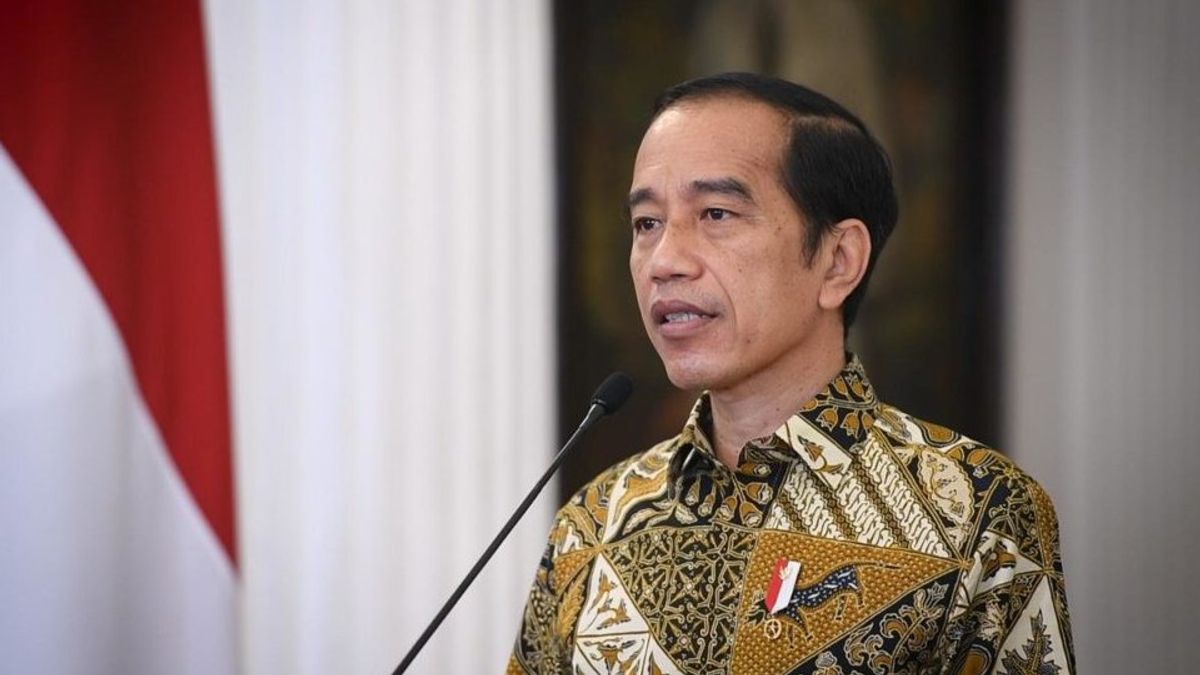JAKARTA - President Joko Widodo (Jokowi) recently glorified an invitation to hate foreign or foreign products. The invitation aims to protect MSMEs. He stated that it is okay to dislike foreign products.
President Jokowi's statement then drew reactions from various parties, one of which was Indef Research Director Berly Martawardaya. He questioned which invitation to hate foreign products from Jokowi for imported products. According to him, there are three types, namely raw and supporting materials, capital materials and consumer goods.
Based on BPS data, said Berly, it can be seen that most of Indonesia's imports of raw materials and supporting materials are 72 percent in 2020. 16 percent of capital goods, and 10 percent of consumer goods such as cars, shoes, bags and others.
"(Imports of consumer goods) are not too much. Even if they are reduced it is good. If raw materials and supporting materials are reduced, domestic production will be disrupted. So it must be accurate if you want to hate imports. Which imports do you want to hate?" in virtual discussion, Monday, March 8.
Berly said that hating foreign products is only suitable for imports of consumer goods. According to him, the next step that must be taken is to reduce imports of consumer goods.
"Yes, imports that are hated are consumptive. Earlier, the hours, shoes, bags, electronics were up skill, but the raw materials and capital materials should not be limited or stopped," he said.
Don't use diction, hate foreign productsResearcher Indef Ahmad Heri Firdaus said diski is something that is commonly used by a country to encourage the strengthening of its domestic industry. However, the diction used by other countries is not like that voiced by President Jokowi.
Furthermore, Heri said, when compared to other countries, for example China, the government uses the diction made in China 2025. Then India uses make in India and others.
"So, if you pay attention, there are no countries that make diction or something like what the President said, namely hating foreign products. Actually, the diction that we are echoing is quite good, namely 100 percent of Indonesian products," he said.

Apart from using the diction of 100 percent of Indonesian products, said Heri, the government could also use the tagline made in Indonesia 2024 instead of using the diction of hate foreign products.
Ahmad Heri Firdaus admitted that he did not agree with the invitation to hate foreign products raised by President Joko Widodo some time ago. This is because this strategy could actually trigger retaliation or retaliation from trading partner countries.
Furthermore, Heri said the invitation to hate foreign or foreign products actually made it difficult for Indonesian products to enter the international market.
"The use of diction to hate foreign products in my opinion is not right. Because it has the potential to trigger protests from trading partner countries, in protests, it will also trigger retaliation later if we are told how to hate Indonesian products? It's also bad that it will make it difficult for our exports, right? , "he said.
Moreover, he said, hating foreign products itself is very contradicting Jokowi's statement to promote exports. If Indonesia wants to increase exports, it must also increase imports due to trade agreements.
[/ read_more]
According to Heri, to promote the use of local products, the government should encourage increased downstream industry. This aims to improve product quality and be more competitive.
"There must be an increase in downstreaming, if it is not competitive, don't force it," he said.
The flood of imported products is due to the consequences of free tradeAhmad Heri said Jokowi's direction to hate foreign products was motivated by the significant increase in imports of consumer goods in recent years amid the e-commerce boom.
Furthermore, he said, the growth in imports of consumer goods was indeed very fast when compared to imports of raw or auxiliary materials and capital goods, although the portion of total imported goods was around 10 percent.

According to him, when the e-commerce boom occurred in 2015 and now, but the competitiveness of local products was not yet mature, digitalization in the middle of liberalization would result in de-industrialization.
"Unless we prepare the competitiveness of local products very well, digitization will actually provide a leap in the growth of our industry," he explained.
However, Heri said that the flood of imported goods experienced by Indonesia was a consequence or implication of the government's decision to participate in various free trade collaborations.
If free trade cooperation is carried out without proper preparation, he said, it will have an impact on the threat of a trade balance deficit. In fact, this will result in an increase in the welfare of the people in Indonesia to be lower than the welfare of the people in partner countries.
[/ read_more page = "2/2"]
Even so, Heri said, in the future, the government does need to regulate or make policies on importing goods that enter through e-commerce and imports, which so far have not received special rules. This is to encourage local MSMEs to contribute more in providing domestic products.
Previously, President Jokowi invited Indonesians to hate foreign products. He asked people to love local products.
"Domestic products echo, hate foreign products. Not only love, but hate. Love our goods, hate foreign products," he said, quoted from the Presidential Secretariat YouTube, Thursday, March 4.
Jokowi's statement drew reactions from various parties. In response to this, Jokowi stated that it was okay to dislike foreign or foreign products. According to him, this is the time for Indonesians to love and be proud of local products.
"It's okay to dislike foreign products, you can't dislike it, it's okay to dislike foreign products. That's just how busy it is. I just hate foreign products, I don't like foreign products," said Jokowi at the Working Meeting. National Hipmi 2021, Friday, March 5.
The former governor of DKI Jakarta said that Indonesia should not only benefit from foreign products. Supposedly, the consumption of domestic products should be increased and echoed.
[/ read_more]
The English, Chinese, Japanese, Arabic, and French versions are automatically generated by the AI. So there may still be inaccuracies in translating, please always see Indonesian as our main language. (system supported by DigitalSiber.id)













